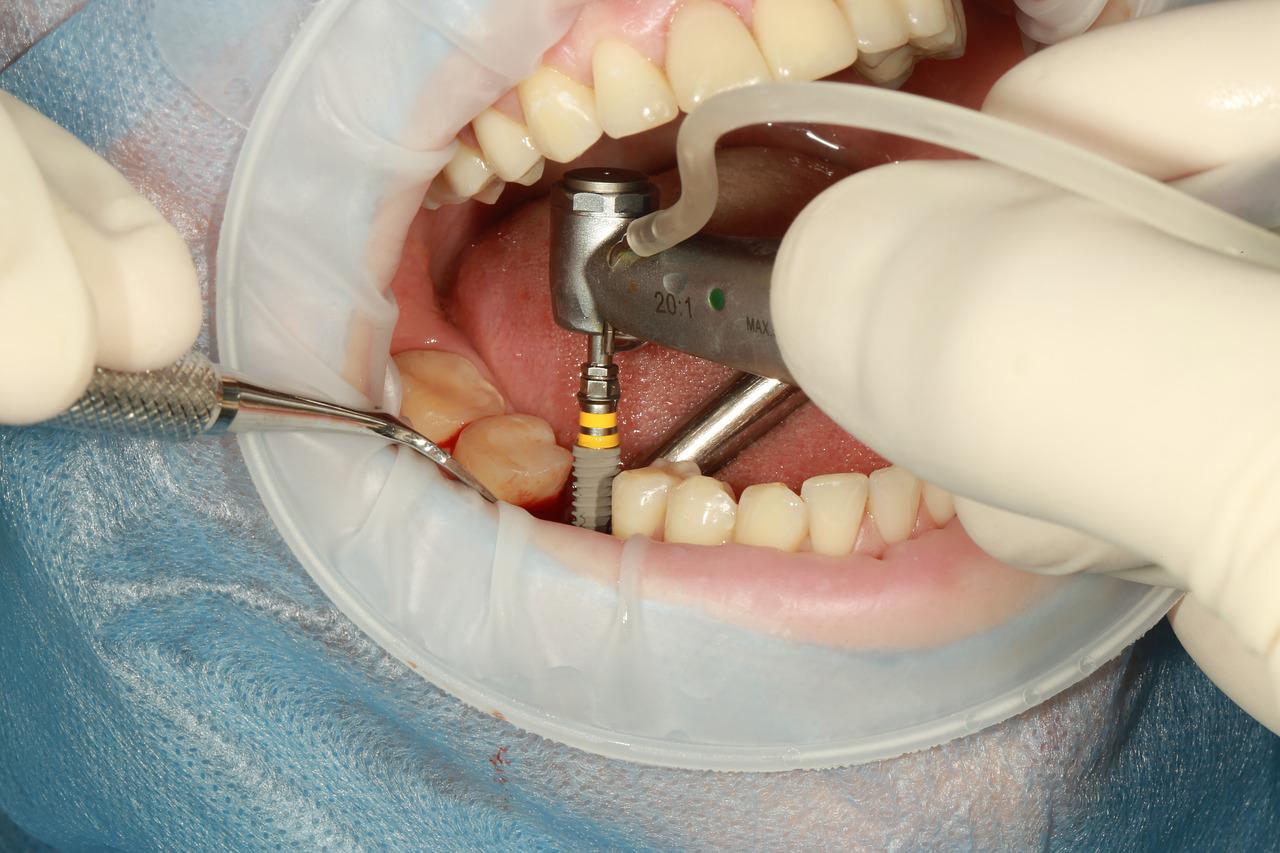A mini dental implant is a small diameter dental implant that is used to support a crown, bridge, or denture. Mini dental implants are typically narrower in diameter than traditional dental implants, which allows them to be placed in areas of the mouth with limited bone volume or in cases where traditional dental implants may not be suitable. They can also be an alternative to traditional dental implants in cases where the patient is unable or unwilling to undergo a surgical procedure to place traditional dental implants.
Mini dental implants are typically placed using a minimally invasive surgical technique, which may involve making a small hole in the gum tissue to insert the implant. The implant is then allowed to heal and integrate with the surrounding bone over a period of several weeks or months. Once the implant has fully integrated, a crown, bridge, or denture can be attached to the implant using a small connector known as an abutment.
Mini dental implants are widely used to support replacement teeth. These implants are smaller than a regular dental implant and therefore more discreet. They can be used to repair teeth that have lost their natural support or to support a crown that is too large for the tooth. A mini dental implant is also smaller than a regular dental implant so it works better in some situations. If you need help deciding which type of implant would be best for you, keep reading to learn more about the differences between mini and regular dental implants.
Mini dental implants are smaller versions of traditional dental implants. When used in conjunction with a regular dental implant, they provide an alternative method of permanently anchoring artificial teeth into the jawbone. However, there are several key differences between the two. Let’s take a look at some key details that you should know about each option.
What is a Mini Dental Implant?
Mini dental implants are surgical implants that are smaller than regular dental implants. They are often used to support a bridge, implant-supported crown or gum-reduced implants. These implants are smaller than regular implants to fit better in certain situations.
Mini implants are often referred to as “mini implants.” These implants are smaller than regular dental implants.
It is important to note that mini dental implants are not suitable for every patient, and their use should be carefully evaluated by a dental professional. Some potential advantages of mini dental implants include faster treatment times, lower cost, and less discomfort compared to traditional dental implants. However, mini dental implants may not be as strong as traditional dental implants, and they may not be suitable for patients with certain medical conditions or in cases where a large amount of biting force is required.
What is a Regular Dental Implant?
Regular dental implants are surgically placed implants that are generally longer than they are wide. These implants are typically used to replace teeth that have been lost due to trauma or that are too badly damaged to save
Regular dental implants are surgically placed implants that are generally longer than they are wide. These implants are typically used to replace teeth that have been lost due to trauma or that are too badly damaged to save.
A regular dental implant is a type of dental restoration that is used to replace missing teeth. It consists of a small titanium screw that is surgically placed into the jawbone, where it serves as an artificial tooth root. Once the implant has fully integrated with the surrounding bone, a crown (a false tooth) can be attached to the top of the implant using a small connector called an abutment.
Dental implants are a popular and effective way to replace missing teeth because they look, feel, and function like natural teeth. They can also help to preserve the integrity of the jawbone and surrounding teeth, as the implant stimulates the bone and helps to prevent atrophy.
To place a dental implant, a dental professional will first make an incision in the gum tissue to expose the bone. They will then drill a hole into the bone and screw the titanium implant into place. The implant will be left to heal and integrate with the bone for a period of several weeks or months. Once the implant has fully integrated, the dental professional will attach the abutment and crown to the implant.
There are several different types of dental implants, including endosteal implants, subperiosteal implants, and zygomatic implants. The type of implant used will depend on the individual patient’s needs and the condition of their jawbone. It is important to consult with a dental professional to determine the best type of implant for your specific needs.
Differences Between Mini and Regular Dental Implants
There are many differences between mini and regular dental implants, but the main one is size.
There are several key differences between mini dental implants and regular dental implants:
- Size: Mini dental implants are generally smaller in diameter than regular dental implants. This allows them to be placed in areas of the mouth with limited bone volume or in cases where traditional dental implants may not be suitable.
- Strength: Mini dental implants are not as strong as regular dental implants, and they may not be suitable for patients with certain medical conditions or in cases where a large amount of biting force is required. Regular dental implants are able to withstand greater biting forces and are typically used to support single crowns, multiple crowns, or fixed bridges.
- Placement procedure: Mini dental implants are typically placed using a minimally invasive surgical technique, which may involve making a small hole in the gum tissue to insert the implant. Regular dental implants are typically placed using a more invasive surgical technique, which involves making an incision in the gum tissue and drilling a hole into the jawbone to place the implant.
- Healing time: Mini dental implants typically require a shorter healing time than regular dental implants. This is because they are placed using a less invasive surgical technique and because they do not need to be as deeply anchored in the jawbone.
- Cost: Mini dental implants are generally less expensive than regular dental implants. However, it is important to note that the overall cost of dental implant treatment will depend on a number of factors, including the number of implants needed, the type of implant used, and the complexity of the case.
It is important to consult with a dental professional to determine the best type of implant for your specific needs. They will be able to assess your oral health and determine the most appropriate treatment options based on your individual circumstances.
When Should You Use Mini Dental Implants?
Mini dental implants are often a good choice for patients who have very small areas to place implants. In these situations, a mini dental implant will be less noticeable than a regular dental implant.
How to Achieve Success With Mini Dental Implants
To achieve success with mini dental implants, it is important to follow your dental professional’s instructions for care and maintenance. Some steps you can take to ensure the success of your mini dental implants include:
- Follow a healthy oral hygiene routine: Brush your teeth twice a day with a fluoride toothpaste and floss daily to remove plaque and food particles from between your teeth.
- Avoid biting or chewing hard or sticky foods: Hard or sticky foods can damage your mini dental implants or cause them to loosen. Avoid biting or chewing on hard or sticky foods, and be careful when eating foods that may be difficult to chew.
- Attend regular check-ups and cleanings: Make sure to attend regular check-ups and cleanings with your dental professional to ensure that your mini dental implants are functioning properly and to address any issues that may arise.
- Do not smoke: Smoking can increase your risk of implant failure and can also lead to other oral health problems. If you smoke, consider quitting to improve your chances of success with mini dental implants.
- Follow your dental professional’s instructions for care and maintenance: It is important to follow your dental professional’s instructions for care and maintenance of your mini dental implants. This may include taking prescribed medications and following a specific oral hygiene routine.
By following these steps, you can help ensure the success of your mini dental implants and maintain good oral health. It is important to consult with a dental professional to determine the best care and maintenance routine for your specific needs.
When Should You Use Regular Dental Implants?
Regular dental implants are a good choice for many people who are missing one or more teeth. They can be used to replace a single tooth, multiple teeth, or a full arch of teeth. Regular dental implants are suitable for people with sufficient bone density in their jaw, as the implant requires a strong foundation in order to function properly.
Regular dental implants are a good choice for people who:
- Want a long-term solution for missing teeth: Dental implants are a permanent solution for missing teeth, as they are anchored into the jawbone and function like natural teeth.
- Have healthy gums and sufficient bone density: Regular dental implants require a strong foundation in the jawbone in order to function properly. If you have healthy gums and sufficient bone density, regular dental implants may be a good choice for you.
- Want to preserve the integrity of the jawbone: Dental implants stimulate the jawbone, which helps to prevent atrophy and preserve the integrity of the jawbone. This is especially important for people who have lost teeth due to trauma or gum disease.
- Want a natural-looking and functional tooth replacement: Dental implants look, feel, and function like natural teeth, which can help to improve your appearance and self-confidence.
It is important to consult with a dental professional to determine the best type of implant for your specific needs. They will be able to assess your oral health and determine the most appropriate treatment options based on your individual circumstances.
Final Words
A dental implant is a long-lasting solution for supporting teeth. These implants are surgically placed into the jawbone and are designed to last a lifetime. They are a great option for people who have lost teeth due to trauma or who have teeth that are too badly damaged to save.



